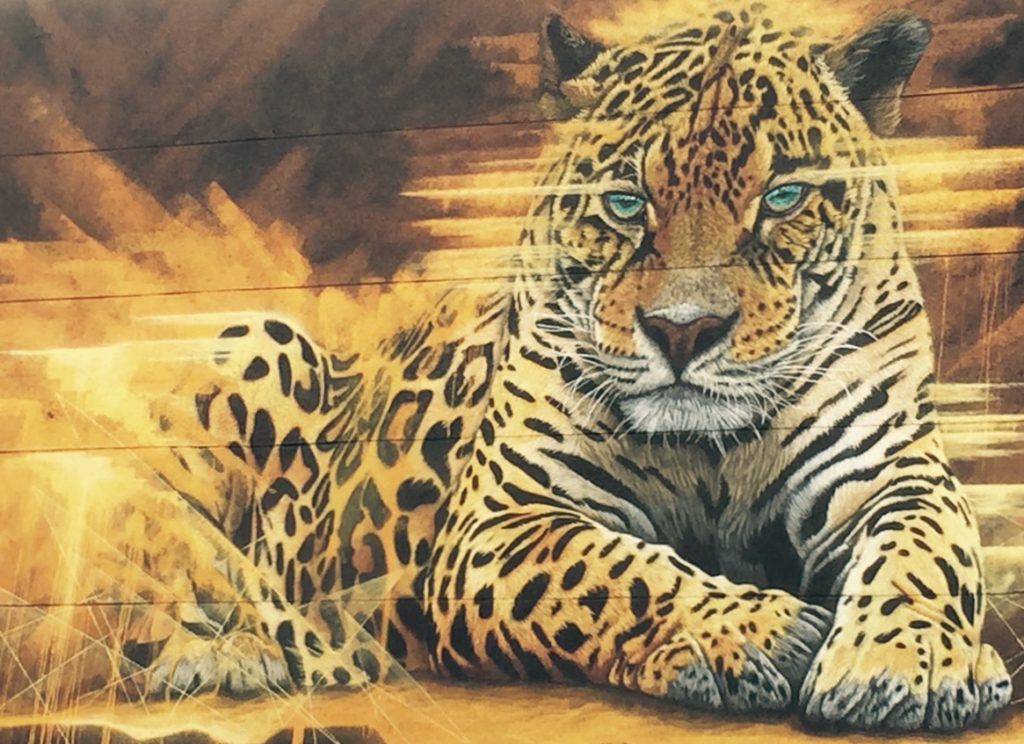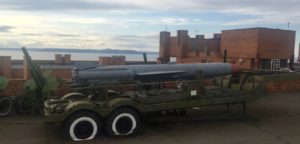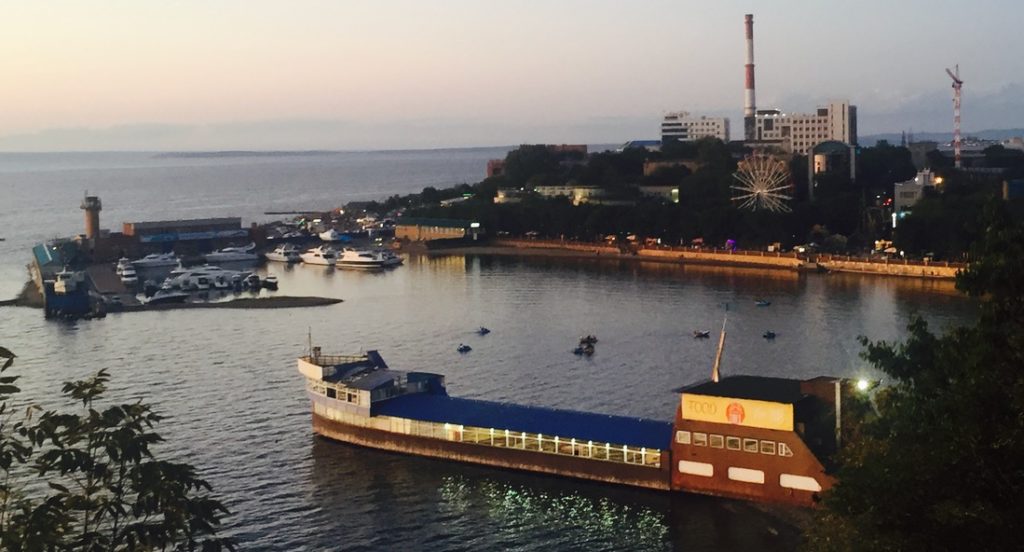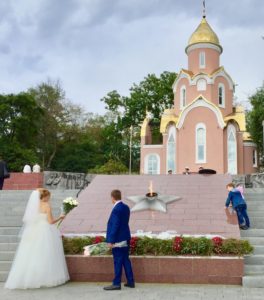 Vladivostok is a city of 600,000 in the Far East of Siberia. Russia grabbed it opportunistically in 1860, back when the Qing Empire had been enfeebled by the Opium Wars and the vicious Taiping Rebellion that left 20 million dead. Russia quickly consolidated its grip expelling the Chinese and transferring people from Ukraine and Belorussia: first by land and ship and by rail once the Trans-Siberian Railway was built.
Vladivostok is a city of 600,000 in the Far East of Siberia. Russia grabbed it opportunistically in 1860, back when the Qing Empire had been enfeebled by the Opium Wars and the vicious Taiping Rebellion that left 20 million dead. Russia quickly consolidated its grip expelling the Chinese and transferring people from Ukraine and Belorussia: first by land and ship and by rail once the Trans-Siberian Railway was built.
Even though it’s only a stone’s (or perhaps a Scud missile’s) throw from North Korea, there’s no hint of the East in the local gene pool. Lonely Planet calls it San Francisco of the East, I suppose, because of its steep, low hills and wide roads, but the gaudy, mid-19th Tzarist buildings in the center, ringed by newer Soviet concrete blocks make it look more like Aberdeen or Edinburgh.
 I’ve long wanted to go to Vladivostok. The word Vladivostok conjures a far-away, mystic place of exile like Timbuktu, Mandalay or Coventry. Over summer I read A Day in the Life of Ivan Denisovich vicariously commenting on many drafts of my son’s school essay. In the book the bleak Siberian gulag is set in a vast open terrain and a bitterly cold climate. The book gets the vast, openness right. Far East Russia is 20 times bigger than UK, but its population of 6 million (and declining) is but a tenth of UK’s.
I’ve long wanted to go to Vladivostok. The word Vladivostok conjures a far-away, mystic place of exile like Timbuktu, Mandalay or Coventry. Over summer I read A Day in the Life of Ivan Denisovich vicariously commenting on many drafts of my son’s school essay. In the book the bleak Siberian gulag is set in a vast open terrain and a bitterly cold climate. The book gets the vast, openness right. Far East Russia is 20 times bigger than UK, but its population of 6 million (and declining) is but a tenth of UK’s.

I came to the city to attend a WWF meeting about the Belt and Road Initiative. In a sense this Chinese policy is a reversal of 19th century balance of power. The Trans-Siberian Railway was totemic of Russia’s colonisation of the East; BRI’s signature investments are a series of railway lines and maritime routes linking China to Europe, Africa and Asia. Once upon a time all roads led to Rome, today Xi Jinping’s big idea is for Beijing to assume a similar co-ordinating role in the world’s nervous system.
Certainly you smell Asian money everywhere. Our hotel had Chinese, Korean, Japanese TV channels and a single English one (checkout the excellent RT state sponsored propaganda channel: my fave is the witty show Redacted Tonight). The menus and museum proffer information in Cyrillic, Chinese and Kanji scripts, Roman letters is fast vanishing.
 I found the contrast between Hong Kong and Vladivostok jarring. The flight is only four-hour but you land in an alien environment. Everyone on the plane was young, Slavic and athletic looking, or they were me. The lack of diversity is at least in part due to Russia’s anti-tourism policy, you couldn’t invent a more Byzantine process to get a visa. The other big difference is Vladivostok has space to burn. There’s no jostling for territory on the roads, pavements, lifts, or restaurants. You can finally stretch your wings. Instead of Hong Kong’s fastidious maintenance of its infrastructure we have Russia’s worrisome neglect. Outside the center’s conference-friendly ambit roads are cratered and the paint on the old buildings peeling. A funicular rattles and creaks as it climbs from the touristic shore – where you can explore the inside of Submarine S-56 – to the hill-top’s viewing point. The people have so much environment, trashing it doesn’t seem to matter. Unlike Hong Kong’s 24/7 work culture, Vladivostok is more interested in having fun on the beach, going for a beer, playing football with the kids.
I found the contrast between Hong Kong and Vladivostok jarring. The flight is only four-hour but you land in an alien environment. Everyone on the plane was young, Slavic and athletic looking, or they were me. The lack of diversity is at least in part due to Russia’s anti-tourism policy, you couldn’t invent a more Byzantine process to get a visa. The other big difference is Vladivostok has space to burn. There’s no jostling for territory on the roads, pavements, lifts, or restaurants. You can finally stretch your wings. Instead of Hong Kong’s fastidious maintenance of its infrastructure we have Russia’s worrisome neglect. Outside the center’s conference-friendly ambit roads are cratered and the paint on the old buildings peeling. A funicular rattles and creaks as it climbs from the touristic shore – where you can explore the inside of Submarine S-56 – to the hill-top’s viewing point. The people have so much environment, trashing it doesn’t seem to matter. Unlike Hong Kong’s 24/7 work culture, Vladivostok is more interested in having fun on the beach, going for a beer, playing football with the kids.
 I liked the phlegmatic can-do-ness permeating the culture. Channel surfing you can catch Putin looking inscrutable and insouciant, not harangued and shifty like a Hong Kong politician. Instead of a shopping channels, I found a DIY channel where the presenter showed us how to repair a broken pair of glasses with glue and Sellotape (you too can sport the Michael Foot look).
I liked the phlegmatic can-do-ness permeating the culture. Channel surfing you can catch Putin looking inscrutable and insouciant, not harangued and shifty like a Hong Kong politician. Instead of a shopping channels, I found a DIY channel where the presenter showed us how to repair a broken pair of glasses with glue and Sellotape (you too can sport the Michael Foot look).
But the trip left me curiously depressed. Vladivostok’s pocket museum reminds us that over the last 35,000 years the fertile lands were denuded of mammoths and the other megafauna by the aborigines: Udege. These were conquered by dynasties of Chinese, white Russian, communist USSR, Japanese finally reverting to Russia. Does wildlife have a chance within Xi Jinping’s Ecological Civilisation? My excellent WWF colleagues helped rescue a tiny Siberian community of Amur Tiger from extinction, as part of our wider Tx2 programme. Can the WWF network reverse the millennia long trends for development to obliterate wildlife and worsen climate change? I hope so.
